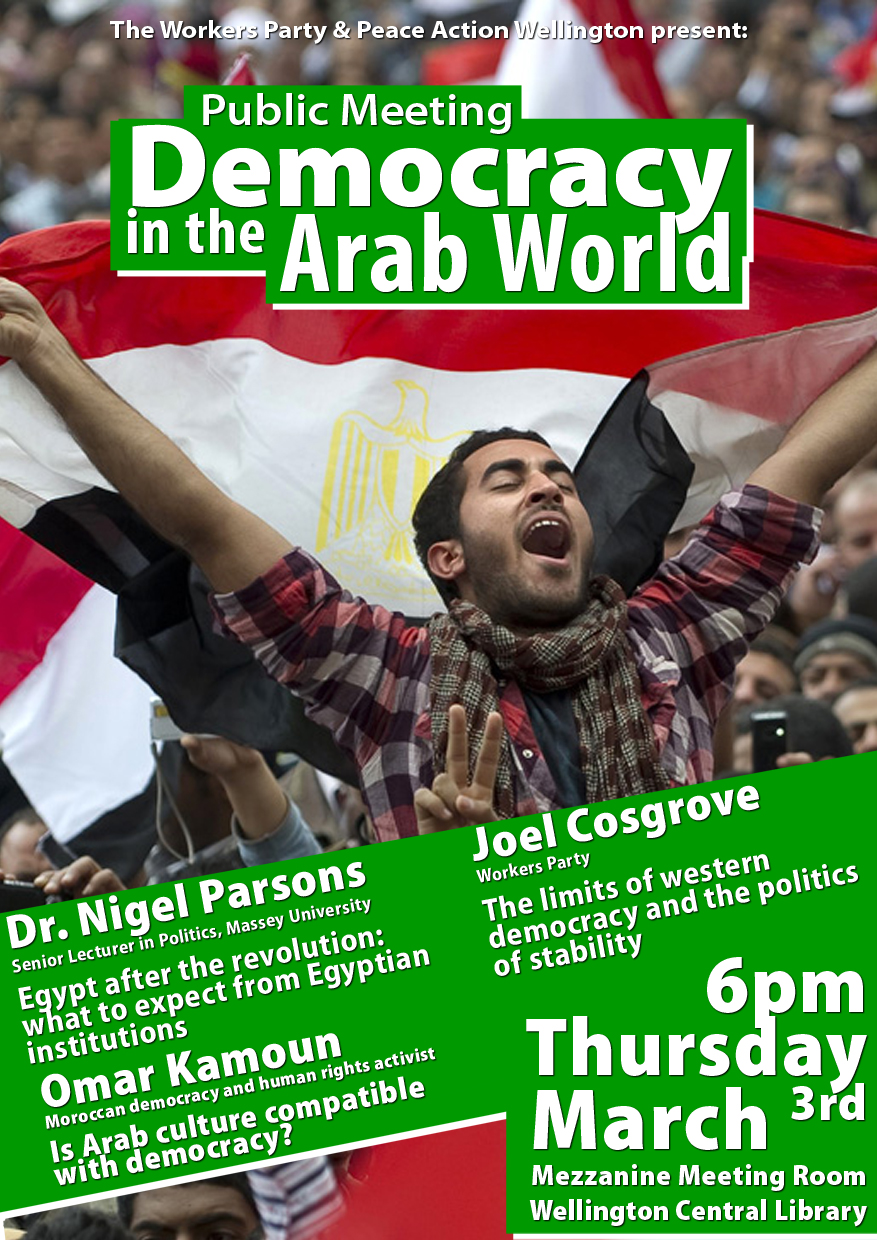The following article is by Marika Pratley, PFLP Campaign Co-coordinator for Wellington branch, and first appeared in the April issue of The Spark.
Public meetings and solidarity pickets have been held around New Zealand in solidarity with the people of Egypt in light of the February rebellions against Mubarak. Since then war in Libya has begun, Saudi Arabia has invaded Bahrain, and with so many drastic changes and uncertainties in the Middle East, the rest of the world watches in anticipation for the next events to unfold.
 How far will these events advance the interests of those leading the protests? And to what extent can the movement be exploited as a gateway for politicians with similar interests to Mubarak? To address these issues a public meeting organised by Peace Action Wellington and Workers Party was held on March 3 in Wellington. Over 90 people turned up to the event. The main speakers were Dr Nigel Parsons (Political Scientist, Massey University) Joel Cosgrove (The Workers Party and PFLP solidarity campaign) and Omar Kamoun (Wellington Palestine Group).
How far will these events advance the interests of those leading the protests? And to what extent can the movement be exploited as a gateway for politicians with similar interests to Mubarak? To address these issues a public meeting organised by Peace Action Wellington and Workers Party was held on March 3 in Wellington. Over 90 people turned up to the event. The main speakers were Dr Nigel Parsons (Political Scientist, Massey University) Joel Cosgrove (The Workers Party and PFLP solidarity campaign) and Omar Kamoun (Wellington Palestine Group).
Egypt and the fall of Mubarak
Dr Nigel Parsons’s talk was an overview on the current situation in Egypt. Mubarak has been overthrown and the military put in charge. His talk was focused on the current state of the New Democratic Party (NDP), the Muslim Brotherhood, and potential outcomes of the upcoming elections to be held in 6 months. Dr Parsons addressed the fact that the NDP is in a problematic situation and also the possibility of US interfering with the elections.
Rebellion or revolution
Joel Cosgrove discussed a socialist perspective on what is going on in Egypt with references to Libya and Tunisia as well. He said that it was not just a spontaneous series of events that happened in late 2010/ early 2011 but that tensions had been building for a long time leading to rebellions and (in the case of Tunisia) revolutionary actions taking place. He argued that what has happened in Egypt is not a ‘revolution’ because the Egyptian military are still in charge. For there to be a revolution it would need to be an overthrow of not just one politician or political party (Mubarak and the NDP) but an entire change of the socio-economic system too. The armed forces of the state had been deployed as a barrier to Egypt advancing to a revolutionary stage. However the rebellions were the beginning stages of democracy – it is an ongoing process.
Why we should oppose Western intervention
Questions about the true political agenda of the West were also raised. Western governments in Europe, NZ, UK, Australia and the USA have historically had a strong interest in the Middle East. New Zealand has troops stationed in not just Afghanistan but the Sinai region of Egypt as part of the New Zealand Contingent Multinational Force and Observers. New Zealand troops have been there since 1981, to help implement the so-called ‘security provisions’ of the Egyptian-Israel Treaty of Peace and guard the border between Egypt and Israel. Peacekeeping is never neutral and it is in the interests of imperialist powers such as Israel and the United States that the border control is maintained. Western intervention is about Western powers exploiting situations for the benefit of large capitalists and politicians, not about the welfare of the people.
Omar Kamoun’s presentation also touched on the issues relating to Western intervention. He extended this by including several examples of how Islamophobia is used as the current scapegoat by western forces as a justification for invading countries, but that this is not a new tactic. Many scapegoats have been used to mask the real reasons for interfering with the affairs of other countries, and it has always been about nations such as Britain and France extending power by having socio-economic control over other countries. Opposing western intervention does not mean endorsing leaders such as Mubarak or Gadaffi – it is about acknowledging that it is the right of the working classes in those countries to fight and win from the ground up.
The presentations were followed by contributions from the floor and discussions of how to further support for the uprisings.
The Workers Party supports the rights of workers in Egypt and the Middle East to oppose political/military powers whether they are internal or from abroad. We must demand troops out of Egypt, Afghanistan and the Middle East and support the workers in those countries in any resistance against New Zealand’s armed forces. Internationalism is about supporting the people on the ground, not serving the interests of politicians in the UN and other western countries that have their political agenda.

Just another WordPress site